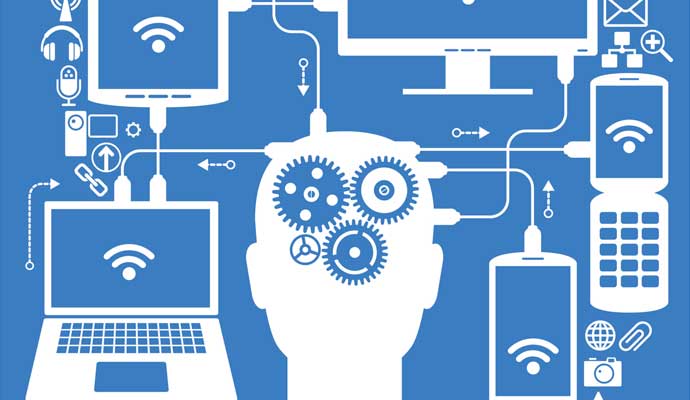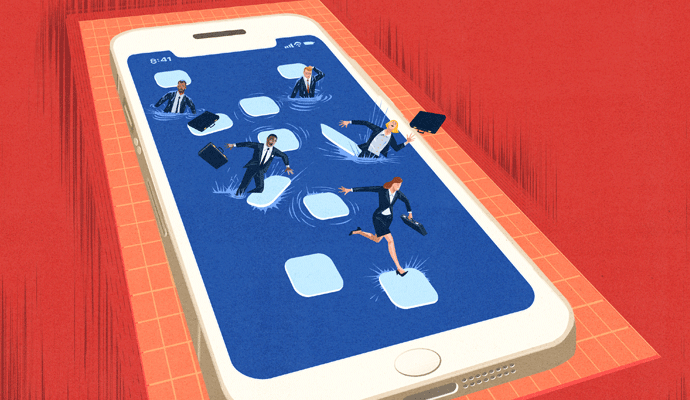Survival skills for the digital age
Three principles can guide you when the connectivity of the digital era becomes overwhelming.
What’s the best place to work? Twenty-five years ago, it might have been a shiny office with a fully stocked canteen for an always-on and always-in-the-office workforce. Cut to today, and the digital era has made mobility a quality today’s workers prize. Baby boomers, Gen X, millennials, and even Gen Z see themselves as belonging to Gen Mobile (pdf). Being connected, by laptop or smartphone, is the most important element of their working lives.
As a result, the office as we know it is fading. Those in charge of human resources must encourage workers to both embrace digital opportunities and respond to their impact.
I have just completed a new report on the worker in the digital era, and have found that the turbulence being created by the embrace of technology is causing managers and workers alike considerable challenges. People no longer need to be working from a single desk for the sake of presenteeism. Instead, they are tethered to a suite of devices and platforms that were designed by humans but are not human themselves: Intelligent technology is more like a third person in the room with a person and her device, but it should not be confused with another human.
My research showed that it is common for people to spend more than 75 percent of the workday on at least three devices, often more. Financial Times journalist Hannah Kuchler, who covers Silicon Valley, told me that “overall, [people] do things dictated by tools they have, and none of the productivity tools in this new collaborative era really encourage proper thinking.” There’s the example of Slack. Answering Slack messages is no different from answering emails, and neither involves deep thinking, which is a prerequisite for coming up with innovative, value-added solutions.
The office-less world requires a new set of digital survival skills, which are vital to preventing burnout. Recent research in Australia shows burnout can increase absenteeism by 37 percent and workplace accidents by nearly 50 percent. To mitigate stress, I have identified three guiding principles:
The office-less world requires a new set of digital survival skills, which are vital to preventing burnout.
1. Simplicity
Remember the 1950s military design principle KISS, which stood for “Keep It Simple, Stupid”? We forget just how much we crave simplicity. Embracing simplicity is a crucial cut-through to coping in the digital landscape. Limit time online, pick up the phone or text someone directly rather than getting sucked into group chats, and stay focused. If you are a manager, audit the number of complex reporting systems that you require your team to use and ensure that quality face-to-face or voice-to-voice time is built in. Humans get things done directly and simply. Don’t allow technology to become a complicating factor.
2. Individuality
Technology has a job to do, which is to turn practically everything into an algorithmic, anonymous process. There are many ways in which this is perfectly good, but humans are individuals, not machines. The rhythms and preferences of people and teams are difficult to shoehorn into computer programs. Nuance and experimentation are required to fit the work process to the project and people at hand. Getting it right often works best with small pilot projects, not one-size-fits-all edicts and corporate-wide systems. In physical health, there is a growing literacy about the value of personalized diets. The same rules should apply at work: Don’t standardize, personalize!
3. Networks
With social media networks embedded in business culture, it is important to remember just how much face-to-face connection matters: Research shows it is 34 times as powerful as email for getting things done. Email is very good as a tennis volley, with the ball pinging back and forth over the net, but often less so for landing the winning shot. In digital workplaces, it is essential to create opportunities for teams to connect in person, and for freelancers and staff members to meet. As Herminia Ibarra, the Charles Handy Professor of Organizational Behaviour at London Business School, points out in her work, personal networking is a skill that people can learn and benefit from, and it’s particularly important for those who choose to freelance.
In an increasingly complex world, we need to check that the technological systems that are supposed to enable us to be more productive are, in fact, delivering. Having the skills to mitigate the ill effects of excessive technology is as essential as being able to take environmental action to clean up air pollution. Accessing information held in the cloud or online is still done by humans, for other humans; even, or especially, in the digitally dominated work world, we must keep our feet firmly on the ground. We need technology to survive, but we need tools to survive the technology too.






